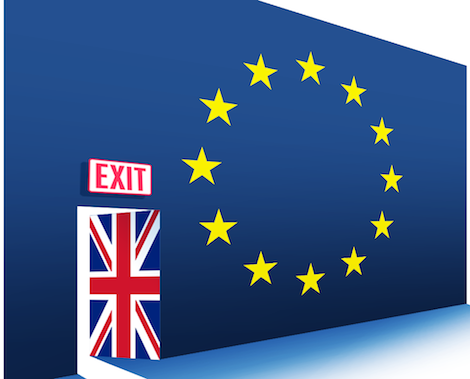Britain is closer than ever to walking out of the E.U. Source: conservativehome.com
After narrowly dodging a political bullet when the 2014 referendum for Scottish independence failed to pass, British Prime Minister David Cameron found himself caught in yet another European political struggle, this time on a larger scale. Now, Cameron faces newfound political challenges with the European Union.
This September, the European Union began to implement an annual payment revision process that required the United Kingdom to pay the E.U. an extra £1.7 billion, or around €2.1 billion, by December 1st. The sudden demand, which would increase Britain’s contribution to the E.U. by nearly 20%, came as a surprise to Britain. In response, David Cameron delivered a fiery speech at a news conference during the Brussels European Union summit proclaiming, “If people think I am paying that on Dec. 1 — no, that is not happening.” While the demand for additional payments was based on purely economic considerations, Cameron’s response seems to be driven more by the tumultuous state of domestic politics in Britain than by international economics.
The increased payment comes as the result of the implementation of the new European System of National and Regional Accounts, or ESA 2010. The European Commission regularly revises its methods for calculating European economies and E.U. member payment dues through updated ESA systems. The ESA is usually revised to align with the broader, global System of National Accounts, or SNA. Thus, the ESA 2010 was created by the European Commission in line with new guidelines for worldwide international accounting made in the SNA 2008. The ESA 2010 attempts to account for other aspects of the economy that systems like its predecessor, the ESA 1995, have traditionally ignored. The most prominent change is increased accountability for underground economic activity, including prostitution and drug trafficking. Using these new measures, European Commission accountants discovered that nations like Britain had thriving underground economies that had never been accounted for. In fact, by one estimate, the underground economy generates nearly £10 billion for the British economy. Thus, these nations had, in effect, been “underpaying” into the system, while nations like Germany and France had been overpaying. The ESA 2010 was drafted in 2013 for implementation in September 2014, so the revisions have been in the works for nearly a year.

After the new measures were used to calculate the size of each member nation’s economy, estimates of the updated accounts were released, with final payment amounts to be released in November. The changes reflected a system-wide overhaul, and did not just target Britain. Nearly every member nation experienced some change in payments. Britain is paying €2.1 billion to make up for its cumulative underpayment; the Netherlands and Italy trail right behind, owing €0.64 billion and €0.34 billion to the E.U., respectively. On the other hand, France will receive a rebate of more than €1 billion, and Germany will receive €0.78 billion. The new system thus impacts a wide spectrum of European nations, though Britain does take the largest hit.
The heated response comes during a particularly difficult time for Cameron, who has been trying to display support for the European Union despite calls from Britain’s conservative right to back away from the E.U. entirely. Cameron is the leader of the British Conservative Party, which threatens to be uprooted by the more right-wing UKIP (the U.K. Independence Party). UKIP was founded in 1993 out of anti-E.U. sentiment, and argues that Britain would be better off independent of the E.U. As the more right wing version of Cameron’s Conservative party, UKIP has recently become a threat to Conservative rule. In October, UKIP won its first parliamentary seat after a Conservative party member defected and ran for the position as a UKIP member. Unless Cameron and the Conservatives can satisfy growing British nationalist sentiment, UKIP may continue to tear at its seams.
Cameron has been attempting to please his more right-wing constituency and compete with UKIP. He has promised that if elected in 2015, he will hold a referendum vote in 2017 to determine whether the U.K. would stay part of the E.U. By doing so, Cameron has promised the British people the chance to walk away from the European Union entirely, just as UKIP proposes. However, when proposing the referendum Cameron also stated, “I don’t want Britain to leave the EU. I want Britain to reform the EU.” In order to stick to those words, Cameron needs to prove to the British people that the E.U. system and Britain’s place within it can be reformed. But the new E.U. demands make that vision nearly impossible to support, serving as fuel for the fire that is starting to singe Cameron’s political image. Cameron’s blunt refusal to pay the E.U. bill, then, is more of a political move than an economic one, meant to answer angry taxpayers, growing anti-E.U. sentiment in Britain, and UKIP demands.
Cameron’s promise to hold a referendum on the E.U. and his refusal to pay the requested £1.7 billion have embittered Britain’s relationship with the European Union. E.U. officials have stated that it would not be feasible to give Britain an extension on the payment deadline or renegotiate the payment. After all, the adjustments are based upon purely economic, not political, calculations. Britain can pay its dues, or leave the European Union. The latter could potentially cripple the British economy, as companies are unwilling to invest in Britain in the midst of such economic uncertainty. Moving away from the E.U. would disrupt European business and cost British firms valuable E.U. member state benefits. In fact, some banks are already considering moving to Ireland if Britain leaves the E.U. Additionally, leaving the E.U. would drastically decrease Britain’s influence on its European neighbors and the international economy as a whole, leaving it both economically and politically isolated from the heart of western Europe.
Cameron has started down a road that he can no longer turn back on. By promising a national referendum on E.U. membership and refusing to fulfill hiked E.U. payments, he has embraced the conservative ideology that will keep his party afloat, at the potential risk of allowing a British economic system based on the E.U. to sink.






Be First to Comment